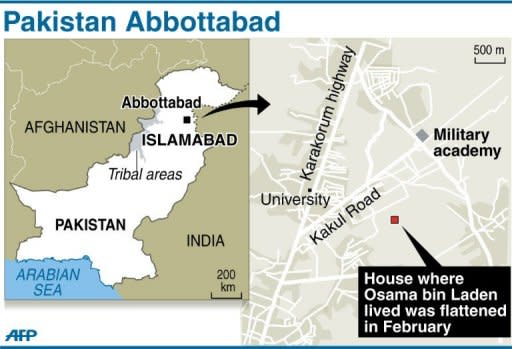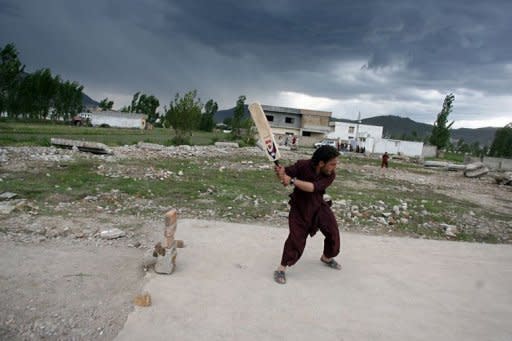Pakistan on alert for bin Laden anniversary
Pakistan was in a state of high alert Wednesday over fears terrorists could mark the first anniversary of Osama bin Laden's killing by American Navy SEALs with revenge attacks. The anniversary of the single most humiliating event in recent Pakistani history caps a devastating year for the country. Its dubious reputation has been dragged deeper through the mud and its relationship with the United States is as bad as ever as questions on Islamabad's intelligence failures or complicity with Al-Qaeda remain unanswered. Apart from the breakdown of its alliance with the West, little has changed. A year after the Al-Qaeda terror chief was found living with three wives on the doorstep of Pakistan's equivalent of West Point, the country is still accused of sheltering a string of America's most-wanted terror suspects. Ayman al-Zawahiri, bin Laden's successor, is suspected to be in Pakistan, as is Afghan Taliban leader, Mullah Omar. Sirajuddin Haqqani, the de facto leader of the Haqqani network blamed for last month's assault on Western targets in Kabul -- the largest coordinated insurgent attack in 10 years of war -- is based in the tribal belt on the Afghan border, as is Pakistani Taliban leader Hakimullah Mehsud. Last month Washington offered $10 million for information leading to the arrest and conviction of Hafiz Saeed, the Pakistani accused of masterminding the 2008 Mumbai attacks who lives openly in Pakistan. The bounty is eclipsed only by the $25 million reward for Zawahiri. Pakistani officials told AFP they fear attacks could mar the anniversary, saying that security agencies had been ordered to be "extra vigilant" on Wednesday. Last year, the Taliban carried out a string of revenge attacks that included a suicide bombing on a police training centre that killed nearly 100 people. "These agencies are in a state of high alert and have been directed to be very careful since this is going to be an important day," one security official told AFP on condition of anonymity. Western embassies in Islamabad have issued warnings, advising citizens to avoid public places for fear of attack. The US embassy in particular has restricted staff from going to restaurants and markets until May 5. In neighbouring Afghanistan, the capital Kabul was hit with a suicide car bomb shortly after US President Barack Obama marked the anniversary by slipping into the country to make an address from the Bagram air base. In a highly political election-year speech, Obama said a "time of war" was ending in a moment of US renewal. About two hours after his departure, Afghan police said a suicide car bomb detonated in an area of Kabul close to several foreign military bases, prompting the US embassy to warn staff to take cover and go into lockdown. The explosion, believed to have targeted a foreign guesthouse, was a reminder of the extremist threat that stalks Afghanistan still, a decade after the Taliban were driven from power for refusing to hand over bin Laden following the 9/11 attacks. Pakistani authorities have sought to ignore the anniversary, trying to erase all trace of bin Laden, who lived in the country from December 2001 until his death last May, according to testimony from his widow Amal. The home in Abbottabad, where he spent six years, was bulldozed in the dead of night in February, and his three widows and 10 children were deported to Saudi Arabia last Friday. Nor is there any immediate sign of Islamabad patching up ties with Washington. It shut down NATO supply lines into Afghanistan five months ago over the killing of 24 soldiers in US air strikes and it remains unclear whether Pakistan will attend this month's Chicago summit on Afghanistan. To American disappointment, a commission tasked with getting to the bottom of the bin Laden debacle is yet to publish its findings and has even questioned whether he was definitely killed in the raid. Despite the lack of public support for bin Laden, the public narrative has been consumed by fury over America's violation of sovereignty and insult in not keeping Islamabad in the loop, rather than soul-searching about the country's relationship with Islamist terror. Conspiracy theories have festered in a climate of anti-Americanism fuelled by poverty, an economic slowdown, power cuts and years of deadly Islamist bomb attacks. Yet there were no mass protests last year and few rallies are expected Wednesday. "People can see what miseries this ideology has actually brought for Pakistan. That is why it is not surprising there was no outpouring for bin Laden last year, when he was killed, nor will people express this on his anniversary," said political analyst Imtiaz Gul.




